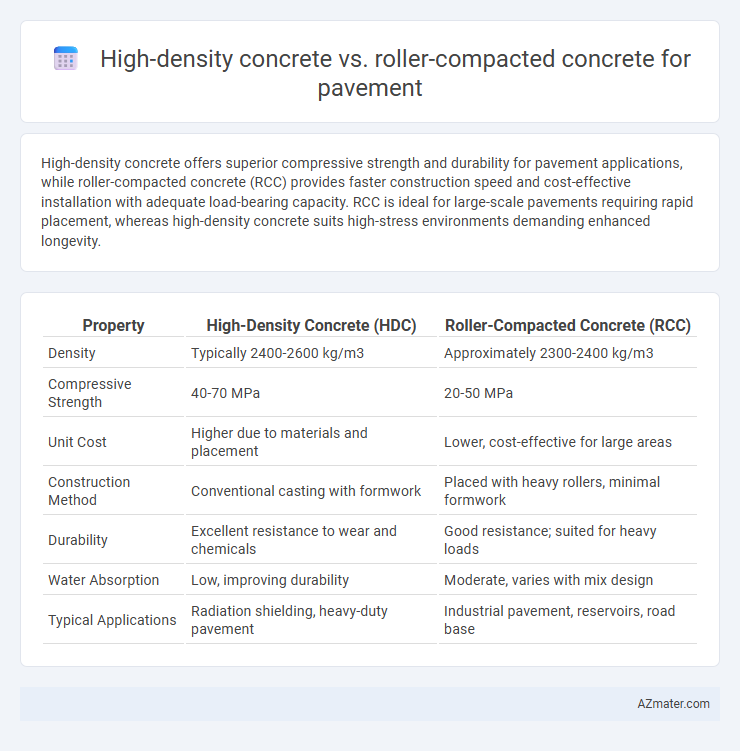High-density concrete offers superior compressive strength and durability for pavement applications, while roller-compacted concrete (RCC) provides faster construction speed and cost-effective installation with adequate load-bearing capacity. RCC is ideal for large-scale pavements requiring rapid placement, whereas high-density concrete suits high-stress environments demanding enhanced longevity.
Table of Comparison
| Property | High-Density Concrete (HDC) | Roller-Compacted Concrete (RCC) |
|---|---|---|
| Density | Typically 2400-2600 kg/m3 | Approximately 2300-2400 kg/m3 |
| Compressive Strength | 40-70 MPa | 20-50 MPa |
| Unit Cost | Higher due to materials and placement | Lower, cost-effective for large areas |
| Construction Method | Conventional casting with formwork | Placed with heavy rollers, minimal formwork |
| Durability | Excellent resistance to wear and chemicals | Good resistance; suited for heavy loads |
| Water Absorption | Low, improving durability | Moderate, varies with mix design |
| Typical Applications | Radiation shielding, heavy-duty pavement | Industrial pavement, reservoirs, road base |
Introduction to Pavement Concrete Types
High-density concrete, characterized by its increased weight and enhanced durability, offers superior load-bearing capacity and resistance to environmental factors, making it ideal for heavy-duty pavement applications. Roller-compacted concrete (RCC) combines the strength of conventional concrete with the efficiency of asphalt paving techniques, allowing rapid construction with lower costs and high compressive strength. Both types serve distinct roles in pavement, with high-density concrete excelling in structural performance and RCC favoring speed and economic viability in large-scale projects.
Overview of High-Density Concrete
High-density concrete is a specialized concrete variant characterized by a high unit weight due to the incorporation of heavyweight aggregates such as barite, magnetite, or hematite, typically ranging from 3000 to 4000 kg/m3 compared to normal concrete's 2400 kg/m3. This material provides enhanced radiation shielding, increased durability, and superior compressive strength, making it ideal for heavy-duty pavement applications in industrial or military zones. The dense microstructure reduces permeability and improves resistance to abrasion and chemical attacks, offering long-lasting performance in harsh environmental conditions.
Key Features of Roller-Compacted Concrete
Roller-compacted concrete (RCC) is characterized by its zero-slump consistency, allowing for rapid placement with heavy rollers, which significantly reduces construction time and labor costs compared to high-density concrete. RCC's lower cement content and reduced water usage improve durability and resistance to cracking, making it ideal for heavy-traffic pavement applications such as industrial yards and highway shoulders. Its high density enhances load-bearing capacity while providing excellent abrasion and freeze-thaw resistance, optimizing pavement performance under extreme conditions.
Material Composition Comparison
High-density concrete typically incorporates heavyweight aggregates such as magnetite or hematite to achieve higher density and enhanced durability, resulting in a compressive strength range of 50 to 100 MPa. Roller-compacted concrete (RCC) consists of a drier mix with lower cement content and coarse aggregates, designed for rapid placement and compaction using rollers, achieving compressive strengths generally between 20 to 40 MPa. The material composition differences primarily influence performance characteristics, with high-density concrete providing superior load-bearing capacity whereas RCC offers cost-effective and swift construction for pavement applications.
Structural Performance Analysis
High-density concrete offers superior compressive strength and durability, making it ideal for pavements subjected to heavy traffic loads and high-impact forces, while roller-compacted concrete provides efficient compaction and rapid construction with moderate strength suitable for lower traffic volumes. Structural performance analysis reveals high-density concrete's enhanced resistance to fatigue cracking and deformation under repeated loading, whereas roller-compacted concrete demonstrates adequate load distribution but may require thicker layers to achieve similar structural longevity. Both materials benefit from optimized mix designs and reinforcement to meet specific pavement performance requirements, emphasizing the trade-offs between strength, construction speed, and cost-effectiveness.
Durability and Longevity Factors
High-density concrete offers superior durability for pavement due to its lower permeability and higher compressive strength, which enhances resistance to freeze-thaw cycles and chemical attacks. Roller-compacted concrete (RCC) provides excellent load-bearing capacity and rapid construction but may require proper curing to achieve optimal long-term durability. Both materials extend pavement longevity by minimizing cracking and surface wear under heavy traffic conditions, with the choice depending on site-specific durability demands and maintenance strategies.
Installation Techniques and Speed
High-density concrete requires traditional formwork and careful vibration during installation to ensure uniform compaction, which can be time-consuming but provides exceptional durability for pavement surfaces. Roller-compacted concrete (RCC) utilizes a dry mix that is spread and compacted with vibratory rollers, significantly speeding up installation by eliminating the need for forms and extensive finishing. The rapid placement and early strength gain of RCC make it ideal for large-scale pavement projects demanding fast turnaround times.
Cost Considerations and Economic Impact
High-density concrete typically incurs higher material and production costs due to its increased cement and aggregate content, which can elevate initial pavement construction expenses. Roller-compacted concrete (RCC) offers a more cost-effective alternative with faster placement and reduced labor requirements, significantly lowering overall project budgets and enabling quicker return to service. Long-term economic impacts favor RCC through reduced maintenance costs and enhanced durability, delivering improved life-cycle cost efficiency compared to high-density concrete pavements.
Typical Applications in Pavement Construction
High-density concrete is commonly used in heavy-duty pavement applications such as airport runways and industrial flooring, where high strength and durability are critical to withstand heavy loads and abrasive traffic. Roller-compacted concrete (RCC) is favored for large-scale infrastructure projects like highways, dam faces, and parking lots due to its rapid placement, lower cost, and excellent load-bearing capacity. Both materials serve distinct roles in pavement construction, with high-density concrete providing superior compactness and RCC offering efficient construction for extensive surface areas.
Selecting the Right Concrete for Your Pavement Project
High-density concrete offers superior durability and load-bearing capacity, making it ideal for heavy-traffic pavement projects requiring long service life. Roller-compacted concrete provides cost-effective construction with faster placement and lower water content, suitable for large-scale pavements like industrial yards and highways. Selecting the right concrete depends on traffic intensity, budget constraints, and project timeline, balancing performance requirements with economic considerations.

Infographic: High-density concrete vs Roller-compacted concrete for Pavement
 azmater.com
azmater.com